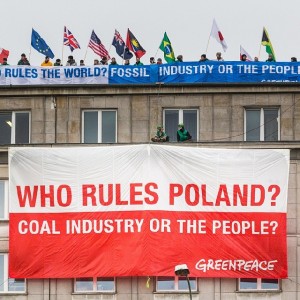Coal Summit Opens Amidst UN Climate Talks
admin | November 19, 2013.
Early Monday morning, amidst the annual climate negotiations in Warsaw, the International Coal and Climate Summit opened at the Ministry of the Economy. Christiana Figueres, the UNFCCC Executive Secretary, was due to address it despite disapproval from the NGO community.
Outside the ministry, a group of Greenpeace activists scaled a building holding large banners that read ‘Who Rules the World? Fossil Industry or the People?” and ‘Who Rules Poland? Coal Industry or The People?’.
Considerable media attention has surrounded this summit considering it is an industry event. This is in part due to the avid support of the Polish Government and Figueres’ controversial attendance. Her attendance is being seen as bringing legitimacy to the coal industry and inviting business into the climate negotiations.
Milton Catelin, CEO of the World Coal Association, emphasised that this was not the first time these two summits have coincided. The goal is to open a dialogue with NGOs and government and move past rhetoric. Other speakers echoed his sentiment around the importance of engaging the coal industry moving pass the status quo.
Deputy Prime Minister of Poland and Minister of Economy Jerzy Buzek said that after the disaster in the Philippines no one can deny the effects of climate change. However, coal will continue to be an important fuel for Poland and the world. Buzek also sent a message back inside the COP19 negotiations lamented at the empty Green Climate Fund and questioned why countries could not instead substitute finance for technologies.
Figueres’ message was frank and directed at both sides of the issue: “let me be clear from the outset that my joining you today is neither a tacit approval of coal use nor a call for the immediate disappearance of coal. But I am here to say that coal must change rapidly and dramatically”.
She outlined what the transition of coal must look like: “there are some fundamental parameters of this transition. Close all existing subcritical plants, implement safe CCUF’s on all new plants, even the most efficient and leave most existing reserves in the ground.”
Figueres compared solving climate change to landing on the moon; back in the 1960s, no one knew how but it was done. Her message, overall, was well received by the participants. Godfrey Gomwe, CEO of Thermal Coal, said it was “just right” and “conciliatory” in tone. Adding that he echoed her message that “we are part of the problem and solution.”
All speakers noted that coal is fundamental in the growth of developing countries. Coal is a cheap and reliable energy source that developing countries can benefit from in the same way developed countries have.
Gomwe called for the international community to provide loans so that the developing world could afford to build the most efficient plants possible, not just the cheapest. A one per cent efficiency increase in a coal plant can reduce emissions by up to two per cent.
The hovering presence of activists outside of the summit did not go unnoticed and their message was contrary to those inside. Martin Kaiser from Greenpeace, said that “new investments in fossil fuels, like coal and oil, need to be stopped and transferred into renewable energy.”
The two-day summit is expected to bring together coal industry leaders to develop a strategy for the coal sector to address climate change.
By Andrew Johnson and Andrés Fuentes, photo by Jade Neville and Greenpeace/Konrad Konstantynowicz.












comment